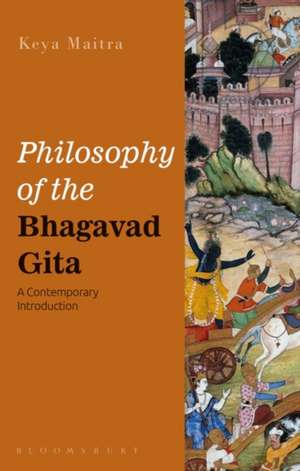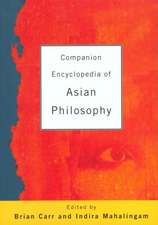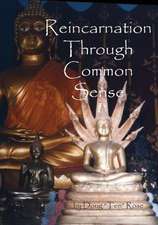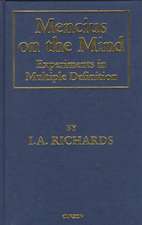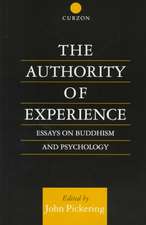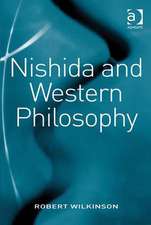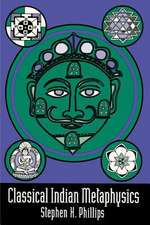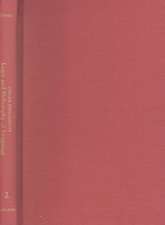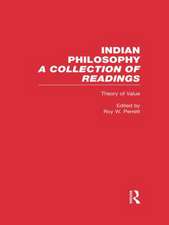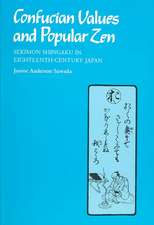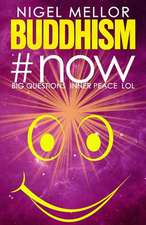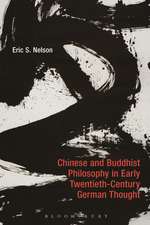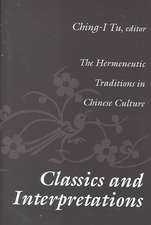Philosophy of the Bhagavad Gita: A Contemporary Introduction
Autor Professor Keya Maitraen Limba Engleză Paperback – 21 mar 2018
| Toate formatele și edițiile | Preț | Express |
|---|---|---|
| Paperback (1) | 151.84 lei 22-36 zile | |
| Bloomsbury Publishing – 21 mar 2018 | 151.84 lei 22-36 zile | |
| Hardback (1) | 465.56 lei 43-57 zile | |
| Bloomsbury Publishing – 18 apr 2018 | 465.56 lei 43-57 zile |
Preț: 151.84 lei
Preț vechi: 186.96 lei
-19% Nou
Puncte Express: 228
Preț estimativ în valută:
29.05€ • 30.41$ • 24.18£
29.05€ • 30.41$ • 24.18£
Carte disponibilă
Livrare economică 10-24 martie
Preluare comenzi: 021 569.72.76
Specificații
ISBN-13: 9781350040182
ISBN-10: 1350040185
Pagini: 208
Dimensiuni: 138 x 216 x 20 mm
Greutate: 0.27 kg
Editura: Bloomsbury Publishing
Colecția Bloomsbury Academic
Locul publicării:London, United Kingdom
ISBN-10: 1350040185
Pagini: 208
Dimensiuni: 138 x 216 x 20 mm
Greutate: 0.27 kg
Editura: Bloomsbury Publishing
Colecția Bloomsbury Academic
Locul publicării:London, United Kingdom
Caracteristici
Offers rich context and opportunities for cross-cultural philosophical dialogue by highlighting the fertile philosophical content of the Gita
Notă biografică
Keya Maitra is Chair and Professor in the Department of Philosophy at University of North Carolina, Asheville, USA.
Cuprins
AcknowledgementsHow to Use This BookIntroduction1. Arjuna's Sorrow2. The Yoga of Knowledge (And Philosophy)3. The Yoga of Action4. The Yoga of Renunciation of Action Through Knowledge5. The Yoga of Renunciation6. The Yoga of Meditation7. The Yoga of Knowledge and Judgment8. The Yoga of the Imperishable Brahman9. The Yoga of Sovereign Science and Sovereign Secret10. The Yoga of Divine Manifestations11. The Yoga of the Vision of the Cosmic Form12. The Yoga of Devotion13. The Yoga of Difference between the Field and the Field-Knower14. The Yoga of the Division of Three Gunas15. The Yoga of the Supreme Purusha16. The Yoga of the Division between the Divine and the Demoniacal17. The Yoga of the Threefold Faith18. The Yoga of Liberation and RenunciationGlossaryBibliographyIndex
Recenzii
In her lucid and student-friendly translation of the Bhagavad Gita, Maitra has uniquely and cogently reclaimed the centrality of the yoga of knowledge alongside karma and devotion through her astute philosophical eye. The introduction exemplifies Maitra's sharply refined ability to tack gracefully between South Asian and Eurocentric philosophical and ethical concepts in a finely woven integrative approach that allows students to engage this transglobal text with clarity. The "philosopher's corner" feature at the end of each chapter challenges students to query culturally diverse interpretations of agency, logic, ethics, and epistemology, making this translation my new top choice for pedagogical use.
This may well become the standard translation for teaching the Bhagavad Gita in philosophy courses. Maitra has done an admirable job of balancing the demands for readability and fidelity to the original text. Her Introduction is excellent, striking an ideal balance between scholarly rigour and accessibility for an undergraduate audience. The discussions of the context and the philosophy of the Gita will prepare students well for their first reading of the text. The chapter introductions and "Philosopher's Corners" will help students and instructors alike to appreciate the philosophical depth that lurks beneath the poetic surface of the Bhagavad Gita.
Maitra deserves much praise for a translation that will be widely appealing to a reader at any level of familiarity with the BG or its yogic dialogues. Her willingness to engage the text's visionary potential ... and its philosophical underpinnings ... takes rare skill and a keen awareness of textual nuances.
The book is a valuable contribution not just for the teacher and her student in a classroom, but for anyone who seeks a simple introduction to this ancient text.
Professor Maitra's edition of the Bhagavad Gita is a welcome and valuable contribution to our field, as it both invites and enables her readers to engage the text in light of enduring philosophical questions. Her Introduction is tremendously useful in situating the text in its historical and conceptual contexts. Further, she provides a translation that is at once evocative and philosophically precise - and is supported by a helpful glossary. We are fortunate to now have access to a volume that so effectively makes this philosophically rich text accessible to students, general readers, and academics alike!
True to a text structured by questions and answers, this edition engages in a living dialogue with the Bhagavad-Gita. Maitra highlights essential philosophical questions and approaches in a vibrantly comparative way, illuminating the applied nature of the philosophy throughout. The didactic and devotional, social and literary strands are identified to enable us to see more clearly the complex coherent fabric of the text. A masterful achievement.
This may well become the standard translation for teaching the Bhagavad Gita in philosophy courses. Maitra has done an admirable job of balancing the demands for readability and fidelity to the original text. Her Introduction is excellent, striking an ideal balance between scholarly rigour and accessibility for an undergraduate audience. The discussions of the context and the philosophy of the Gita will prepare students well for their first reading of the text. The chapter introductions and "Philosopher's Corners" will help students and instructors alike to appreciate the philosophical depth that lurks beneath the poetic surface of the Bhagavad Gita.
Maitra deserves much praise for a translation that will be widely appealing to a reader at any level of familiarity with the BG or its yogic dialogues. Her willingness to engage the text's visionary potential ... and its philosophical underpinnings ... takes rare skill and a keen awareness of textual nuances.
The book is a valuable contribution not just for the teacher and her student in a classroom, but for anyone who seeks a simple introduction to this ancient text.
Professor Maitra's edition of the Bhagavad Gita is a welcome and valuable contribution to our field, as it both invites and enables her readers to engage the text in light of enduring philosophical questions. Her Introduction is tremendously useful in situating the text in its historical and conceptual contexts. Further, she provides a translation that is at once evocative and philosophically precise - and is supported by a helpful glossary. We are fortunate to now have access to a volume that so effectively makes this philosophically rich text accessible to students, general readers, and academics alike!
True to a text structured by questions and answers, this edition engages in a living dialogue with the Bhagavad-Gita. Maitra highlights essential philosophical questions and approaches in a vibrantly comparative way, illuminating the applied nature of the philosophy throughout. The didactic and devotional, social and literary strands are identified to enable us to see more clearly the complex coherent fabric of the text. A masterful achievement.
